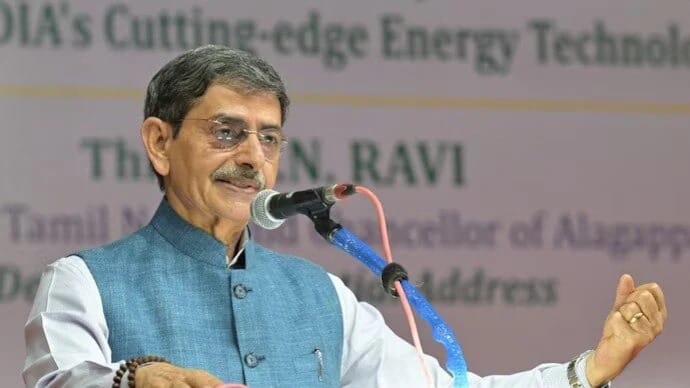Tamil Nadu Governor Bills have sparked nationwide debate after the Supreme Court strongly criticized the delay in clearing 10 important legislative measures. The court emphasized that a Governor cannot indefinitely withhold bills passed by the elected government.

Governors cannot forever postpone taking action on laws, the Supreme Court ruled in a landmark decision, declaring such inactivity to be unlawful and unconstitutional.
The Supreme Court on Tuesday overturned Governor RN Ravi’s order to withhold measures passed by the state Assembly, deeming them “illegal.” This was a major win for the Tamil Nadu administration. The court established a clear constitutional deadline for governors to act on measures passed by state legislatures while considering the state government’s suit against the governor’s activities.
The Tamil Nadu governor was criticized by the highest court, which ruled that his protracted delay was “non-bonafide” and unconstitutional. The Supreme Court established a clear constitutional deadline for governors to act on measures enacted by state legislatures in addition to removing the governor of Tamil Nadu.
The Supreme Court further ruled that the Governor must operate within the parameters set forth in Article 200 of the Constitution and does not have the power to sit on bills forever. According to the top court, the governor has three months to decide whether to sign a measure, send it back to the House, or send it to the president.
In the Tamil Nadu case, the Court noted that because of the unlawful delay, ten bills that had been pending could be considered assented.
“The Constitution expects the Governor to act expeditiously. Undue delay in clearing the Tamil Nadu Governor Bills violates the very spirit of democratic governance,” the Court said, adding that this move was necessary to “calm waters stirred by a high constitutional functionary.”
The Court categorically held that the “withholding of assent is not an independent or indefinite option”, and that the “concepts of pocket veto or absolute veto do not exist in the Indian Constitution.” The bench emphasized that any delay or inaction on the Tamil Nadu Governor Bills amounts to a clear constitutional breach.
Tamil Nadu Governor Bills: Supreme Court Warns ‘No Room to Do Nothing’ Under Article 200
The Court emphasized that Article 200 restricts the Governor’s discretion, even while it acknowledges that there are some uncommon circumstances in which it may be used, such as when a law could endanger the public or entail issues that need the President’s approval.
“There is no room to do nothing. Citing Article 200 of the Constitution, the Court stated that the Governor had a constitutional duty to take action. The Court stated that “bills remain mere paper” if the due process outlined in this article is not followed.
In strong language, the Court noted that Governors cannot delay action on Tamil Nadu Governor Bills passed by the legislative assembly. If a bill is sent back to the legislature and re-passed, the Governor must assent to it—unless the bill is substantively different. Once a bill is returned and reintroduced, the Governor has no veto power left.
Importantly, the Court clarified that just because the President’s assent is non-justiciable, it does not mean the Governor’s handling of Tamil Nadu Governor Bills is beyond judicial scrutiny. Any action or inaction by the Governor must align with the constitutional scheme and uphold democratic norms.
The Court also invoked the Governor’s oath of office, stressing that it mentions the well-being of the people. It emphasized that in the context of Tamil Nadu Governor Bills, a Governor—as the constitutional head of the State—is entrusted with ensuring the will and welfare of the people, not creating roadblocks for elected legislatures.
The bench noted that “the spirit of the Constitution must guide constitutional authorities when called upon to act.” In order to safeguard democratic processes, the ruling reaffirms that arbitrary inaction can and will be subject to judicial review.
Chief Minister MK Stalin welcomed the Supreme Court’s ruling on the Tamil Nadu Governor Bills, calling it a huge victory not just for Tamil Nadu, but for all states striving to uphold federal principles and democratic governance.















